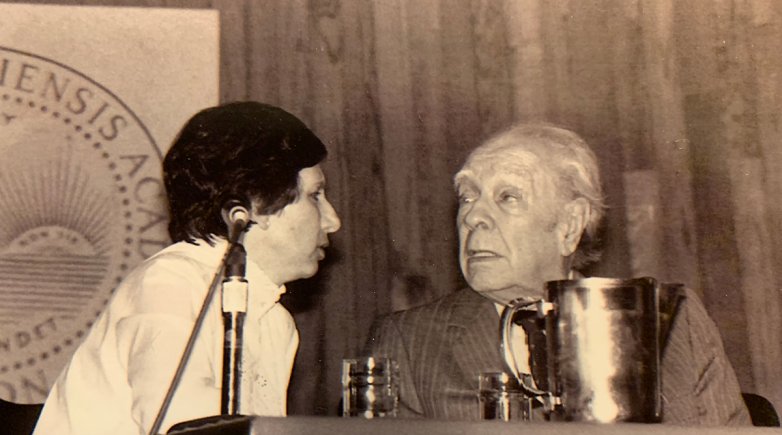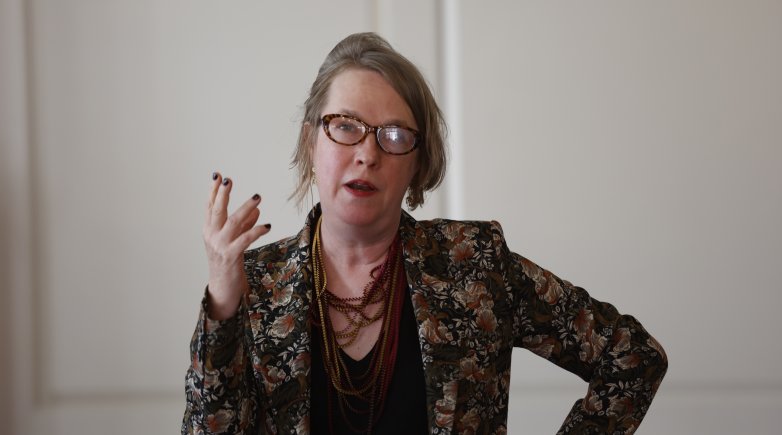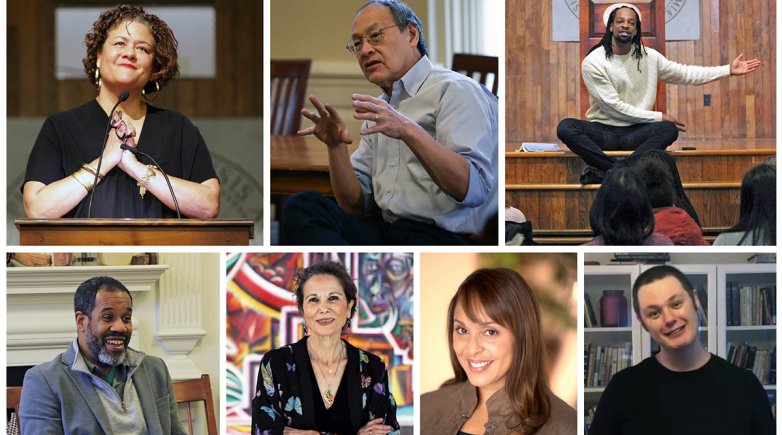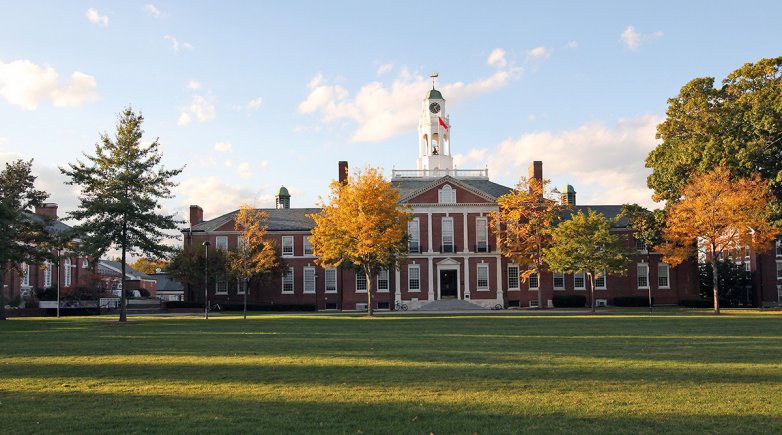Borges and I
A first hand account of Argentine poet Jorge Luis Borges' visit to the Academy as the first Lamont Poet in 1983.
Francesca Piana and Jorge Luis Borges
Francesca Piana, who taught Spanish at the Academy from 1976 through 1986, was instrumental in arranging Borges’ visit. The following is her narrative memory of that time. Originally written in Spanish, this excerpt was translated by Piana’s former student Molly King ’82 and edited for space. Read the full Spanish text.
In the autumn of 1982, a colleague in the English Department of Phillips Exeter Academy, where I was an instructor in Spanish, told me that her department wanted to invite Jorge Luis Borges to spend a week at our institution. She wondered if I would be able to make such a miracle happen.
As it turned out, it would take a miracle. Borges, then in his early 80s and blind since the age of 50, had stopped answering his mail long ago. Those seeking access to him had to do it through his inner circle. And he was not lacking for invitations. It was only with the help of the Center for Latin American and Iberian Studies at Harvard that I managed to get PEA on his schedule.
In the months leading up to his visit, whenever I spoke of the project with colleagues from other academic institutions, I was warned of how exacting Borges could be as a guest. I learned that he was known to abandon the podium midspeech if he didn’t like an “impertinent” question or grew tired of others’ interpretations of his work. Not to mention the quality of meals or lodgings that were required to suit his needs.
I was quite familiar with Borges’ masterly writing. He was a favorite author in our Spanish literature classes, in spite of the level of difficulty his work posed for students. However, I knew little about the man, thus I dedicated myself to reading all I could find about him. I decided to prepare for his arrival as thoroughly as possible, in the hopes that I could avoid having one of his temper tantrums ruin the visit.
Spring days in New England can be dark and rainy. It was one such day in April that I was to meet and escort Borges to Exeter. The trip from Connecticut (where Borges had just participated in a colloquium in his honor) to New Hampshire would be a few hours drive. At 9:00 in the morning, I walked into a library where Borges, seated alone, with his ubiquitous cane and his blind gaze lost in the distance, awaited me. He sensed my steps and lifted his head in my direction. I introduced myself. Almost immediately, a young woman entered the hall. Her name was María Kodama and she was Borges’ companion.
Once in the car, we began to make our way down the rainy highway. Borges took an interest in my background. I told him of my youth in Ecuador and my upbringing among beautiful Baroque churches in Quito. I don’t know how it began, but for a long while we sang childhood nursery rhymes, echoes of our shared Latin American youth. By the time we reached Concord, Massachusetts, Borges and I had established an unexpected camaraderie.
Having learned that Borges was a great admirer of 19th-century New England writers, I had called the National Park Service to find out the hours of Louisa May Alcott’s house and museum. I thought we could stop there on our trip north so that Borges could rest. The person who answered the phone informed me that the museum would be closed the day we hoped to visit. “What a shame!” I said. “I wanted to bring a well-known Argentine author who will be visiting the country.”
“You don’t mean Borges, do you?” she replied with astonishment. “Why, yes!” I answered. “For him, the museum is open any time, any day.”
It was still raining when we entered the home of the author of Little Women. There, by the warmth of a wood fire, we were greeted with steaming cups of hot tea and a freshly baked apple pie. An enormous park ranger, with little literary knowledge but a keen awareness of the importance of the guest, offered Borges her arm saying she was expert in guiding the blind. Borges enjoyed the special privilege they granted him to touch the spines of the books in the Alcott library. Before leaving, the park ranger took off her large hat, put it on Borges’ head, stood by his side and asked me to take their photo.
It was the logical choice to host Borges at the stately Exeter Inn on the edge of campus. I watched as Borges entered his room and touched the walls to familiarize himself with his new surroundings. I surmised that this would make him less dependent on others.
The students had prepared for Borges’ visit by reading some of his work in several languages. Those who didn’t study Spanish read translations of his work in French, English, German, Russian or Italian. The night of his arrival I asked Borges to speak to the general assembly of students. “What do you want me to talk about?” he asked. “Whatever you’d like,” I answered.



